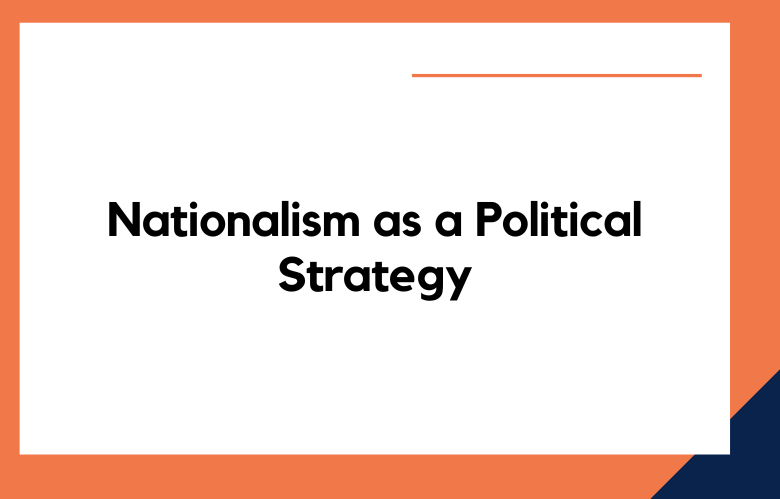Nationalism has gained momentum in recent years as more and more countries adopt it as a political strategy. It is the belief that one’s country is superior to all others and that national interests should come before all else.
While it has its benefits, such as fostering a sense of unity among citizens and promoting economic growth, nationalism also has its drawbacks, such as creating ultranationalism and promoting xenophobia. I will explore the pros and cons of nationalism as a political strategy.
Nationalism as a Political Strategy: The Pros and Cons
In recent years, nationalism has become a hotly debated topic in political circles. Some have embraced putting one’s country first to strengthen their national identity. In contrast, others have criticized it as a thinly veiled form of racism and xenophobia.
But what exactly is nationalism, and can it be used as an effective political strategy? We’ll explore the pros and cons of nationalism as a political technique.
The first advantage of nationalism is that it can be an effective way to unify a divided country. Nationalism unites people with a common goal, which can help to bridge divides between different regions, ethnic groups, and classes.
This can result in a more cohesive and stable society, which can be crucial in times of crisis. For example, during World War II, the United States rallied around the flag to defeat a shared enemy.
The Power of Nationalism: How It Shapes Political Movements
The Power of Nationalism is a fascinating subject that has captured the attention of scholars, historians, and political analysts for decades.
In essence, nationalism refers to a belief in the superiority of one’s country, culture, or ethnicity over others and how it has influenced political movements historically and in contemporary times.
Nationalism can be found to have played a significant role in the rise of modern nation-states and their respective political movements, drawing upon shared identities and values to foster a sense of unity, solidarity, and purpose.
It has been argued that nationalism is often invoked when people feel threatened by outside forces and need to stand together to defend their way of life.
Nationalism and the Politics of Identity
Nationalism and the Politics of Identity is a topic that requires a nuanced understanding of the historical and cultural context of nations.
It is shaped by political, social, and economic factors that define and differentiate a particular population. Nationalism focuses on promoting the interests of a specific nation and aims to build a collective identity of shared culture, language, history, and traditions.
At the core of national identity is “us versus them.” It is often used as a tool to differentiate between the “nationals” and “outsiders” and can lead to conflicts and tensions between communities.
The rise of nationalism can often be attributed to the loss of power and the sense of identity that a particular community experiences. Historical factors like colonization, oppression, and displacement can contribute to the growth of nationalist sentiments where communities aim to assert their distinct identity.
Nationalism, in its extreme form, can give rise to fascism, xenophobia, and ethnic conflicts, as seen in the promotion of far-right parties in Europe and the US.
The Nationalist Playbook: Unpacking Political Strategies
The Nationalist Playbook is a strategic guide to achieving political objectives through nationalist rhetoric, which often appeals to a sense of patriotism and national identity. This playbook has been utilized by various political leaders and movements worldwide, with varying degrees of success.
One of the key strategies in the Nationalist Playbook is to create an “us versus them” dynamic, where the nationalist group is portrayed as being under threat from an external or internal group.
This can involve demonizing minorities or foreigners, blaming them for societal problems, and creating a sense of fear and insecurity among the nationalist group. By doing so, the nationalist leaders can create a cohesive and loyal base of supporters who view them as the protectors of their identity and way of life.
Building Borders: Nationalism and Political Strategies
In modern times, nationalism has become a dominant political strategy used by many politicians and governments across the world to assert their power and dominance both domestically and internationally.
Borders are critical tools in constructing nationalism, as they are physical markers of the extent of sovereign territory and have cultural and symbolic significance.
Building borders can have various political implications, depending on the context and motives of the actors involved.
In some cases, borders are constructed as defensive measures against external threats. For instance, a country may build a border wall to prevent illegal immigrants or terrorist groups from entering its territory.
In other cases, borders may be constructed to assert a government’s legitimacy and national identity. This can lead to the exclusion of ethnic or religious minority groups that are seen as a threat to the dominant ideology or culture.
Nationalism and Populism: A Dangerous Alliance in Politics
When nationalism and populism unite in politics, it can create a dangerous and destructive alliance.
Nationalism, which emphasizes the importance of a country’s identity and culture, can easily tip into extremism if not kept in check. Populism, on the other hand, relies heavily upon the manipulation of public opinion and the promotion of simplistic and often misleading messages.
The combination of these two forces can create an incredibly potent political cocktail.
Nationalistic rhetoric can be used to justify extreme actions, such as the suppression of civil liberties or the expulsion of certain ethnic or religious groups. It can also fuel international conflicts, with countries fighting over the protection of their national identity or territorial claims.
Nationalism: A Double-edged Sword in Political Strategy
Nationalism is a concept that has had a significant impact on political strategies throughout history.
On the one hand, it is a source of loyalty and pride among citizens, fostering unity and a shared sense of purpose. On the other hand, it can also become a divisive force that leads to aggression against other nations, fueling resentment and even conflict.
Nationalism has been used by leaders as a tool for achieving their political objectives, sometimes with beneficial results but often with disastrous consequences.
For example, in the 19th century, nationalism played a crucial role in the unification of Germany and establishing a powerful, centralized state.
This helped to create a stable political structure that endured for decades. Still, it also led to the aggressive expansionism of the Nazi regime, which ultimately plunged the world into a devastating global conflict.
From Patriotism to Nationalism: Examining Political Shifts
Throughout history, the concepts of patriotism and nationalism have influenced the political landscape of various nations. While both ideas are rooted in love and devotion towards one’s country, their implications differ significantly.
Patriotism entails loyalty and pride in one’s nation without necessarily promoting aggression towards other countries. On the other hand, nationalism goes beyond patriotism and is characterized by an aggressive pursuit of power and status, often at the expense of other nations.
The idea of nationalism began to gain popularity in the late 19th century in Europe and quickly spread to other parts of the world. This shift in political ideology was fueled by a desire for national consolidation, a reaction to colonialism, and the sentiment of cultural superiority.
The idea behind nationalism was that a nation’s strength should be measured by its military might, economic prowess, and political influence rather than its cultural heritage.
Nationalism and Symbolism: Political Strategies Uncovered
Nationalism and Symbolism have been widely regarded as potent political strategies that various political leaders and organizations have employed for centuries.
Despite their varied manifestations, the fundamental objective of nationalism and Symbolism in politics remains to engender loyalty and support towards a particular cause, ideology, or nation-state.
This paper seeks to provide a holistic account of the complex interplay between nationalism and Symbolism in the political arena, thereby illuminating the different ways they have been leveraged to achieve political objectives.
Nationalism refers to a political ideology that emphasizes the significance of national identity, culture, and sovereignty as the basis for national unity and political organization.
It often highlights the idea that a particular group or nation-state is inherently superior, and this superiority must be preserved and protected through various means, including excluding external influences or people who might threaten the national identity and culture.
The Rise of Ethno-Nationalism in Political Strategy
In recent years, there has been a growing trend of ethno-nationalism in political strategy globally. Ethno-nationalism is the ideology that emphasizes the importance of ethnic identity and the unity of a shared ethnic group within a country’s political and social fabric.
Proponents of ethno-nationalism often use this ideology to promote their political agendas and gain popular support by appealing to the fears, prejudices, and cultural aspirations of their fellow citizens.
These groups have gained significant traction by framing their message around immigration, national identity, and preserving traditional cultural values. Through this strategy, the far-right has been able to tap into the fears and insecurities of a significant population segment and mobilize them to support their agenda.
Unity and Patriotism
One of the most significant advantages of nationalism is that it brings people together, creating a sense of unity and pride in their country. It promotes patriotism, which is beneficial in times of war and helps create a feeling of national identity. Nationalism helps instill national values, traditions, and symbols that unite citizens and give them a sense of belonging.
Economic Growth
Nationalism can also promote economic growth by encouraging domestic industries and protecting them from foreign competition. Nationalist policies can also create jobs, boost exports, and strengthen the economy.
However, critics argue that nationalistic policies like trade protectionism can lead to economic isolation, limiting the country’s growth potential.
Internationalism
One of the most significant drawbacks of nationalism is that it sometimes leads to ultranationalism, a belief in the superiority of one’s country and culture.
This can lead to unwarranted aggression towards other countries and people from different cultures. Extreme nationalism can also promote xenophobia and discrimination against minorities and immigrants.
Conflict
Nationalism can also lead to conflicts and tensions between countries. When one country promotes its interests over the others, it can lead to feelings of resentment and hostility. Nationalistic policies can also lead to arms races and military conflicts, threatening global peace and stability.
Cooperation and Tolerance
While nationalism has disadvantages, it can also promote cooperation and tolerance among countries. When countries recognize and respect each other’s differences and promote shared values, they create a peaceful and stable international community.
Conclusion:
Nationalism has its pros and cons. While it can foster unity, patriotism, and economic growth, it can also lead to ultranationalism, conflict, and discrimination against minorities. Nationalistic policies can also limit a country’s growth potential by promoting trade protectionism.
The challenge for policymakers is to promote nationalism without fostering aggression and intolerance. By recognizing and respecting each other’s differences and promoting shared values, countries can foster cooperation and tolerance, creating a peaceful and stable global community.
Call: +91 9848321284
Email: [email protected]
Nationalism as a Political Strategy: How Political Leaders Harness Patriotism to Win Power – FAQs
What Is Nationalism In The Context Of Political Strategy?
Nationalism as a political strategy involves promoting national identity, pride, and unity to mobilize voters and consolidate political support, often by emphasizing shared history, culture, or perceived threats.
How Do Politicians Use Nationalism To Gain Support?
Leaders often invoke patriotic symbols, slogans, or narratives to rally citizens, create emotional engagement, and draw clear lines between “insiders” and “outsiders.”
Is Nationalism A Left-Wing Or Right-Wing Strategy?
Both sides of the spectrum can employ nationalism. Right-wing nationalism often focuses on cultural purity and borders, while left-wing nationalism may emphasize anti-imperialism and economic independence.
What Are The Different Types Of Nationalism In Politics?
Types include ethnic nationalism, civic nationalism, cultural nationalism, religious nationalism, and economic nationalism, each targeting specific voter identities or grievances.
How Has Nationalism Impacted Indian Politics?
Nationalism has shaped key movements from independence to present-day campaigns, often used to unite the population during elections and assert India’s sovereignty on global platforms.
Can Nationalism Be Used To Distract From Domestic Issues?
Yes, in some cases, political actors may use nationalism to deflect attention from economic challenges, corruption, or governance issues by shifting focus to external threats or national pride.
What Are Common Symbols Used In Nationalist Political Campaigns?
Common symbols include the national flag, military imagery, historical figures, territorial maps, and religious or cultural monuments that evoke national pride.
Is Nationalism Effective For Electoral Campaigning?
Nationalism is often highly effective, especially in polarized societies or during times of crisis, war, or perceived threat, as it appeals to emotions over policy.
What Are The Dangers Of Excessive Political Nationalism?
It can lead to the exclusion of minorities, suppression of dissent, erosion of democratic norms, xenophobia, and even international conflicts if pushed aggressively.
How Does Nationalism Influence Voter Behavior?
It can increase voter turnout, consolidate party loyalty, and polarize the electorate based on identity, often sidelining issues like healthcare or education.
What Is The Role Of Media In Promoting Political Nationalism?
Media can amplify nationalist rhetoric through selective reporting, framing issues in nationalistic terms, and creating echo chambers that reinforce ideological beliefs.
Can Nationalism Be Used In Digital Political Campaigning?
Digital campaigns often use nationalistic videos, memes, hashtags, and influencers to spread patriotic sentiment and emotionally charge political messages.
How Is Nationalism Linked With Populism?
Both rely on emotional appeals and the idea of a unified people versus a corrupt elite or external threat, often blending seamlessly into campaign narratives.
Is There A Difference Between Patriotism And Nationalism?
Patriotism is love for one’s country, often inclusive and civic-based, while nationalism can be more exclusionary, emphasizing superiority or opposition to others.
Can Nationalism Strengthen National Unity?
When used responsibly, nationalism can promote social cohesion and national pride. However, if misused, it can deepen divisions and marginalize minority voices.
How Do Opposition Parties Counter Nationalist Narratives?
They often emphasize constitutional values, inclusivity, and policy-driven discourse or challenge hyper-nationalist claims through facts and community outreach.
What Role Does History Play In Political Nationalism?
Historical events, freedom movements, wars, and colonial resistance are often repurposed to invoke pride, legitimacy, or emotional attachment to a political vision.
How Can Nationalism Affect Foreign Policy Decisions?
Nationalist politics may push for aggressive stances in diplomacy, trade protectionism, or military responses, often driven more by sentiment than pragmatism.
Are Youth More Susceptible To Nationalist Campaigns?
Youth, especially on digital platforms, are prime targets for simplified nationalist messaging. They are often drawn to narratives of pride, heroism, and belonging.
What Are Some Global Examples Of Nationalism In Politics?
Examples include Brexit (UK), America First (USA), Hindutva politics (India), Erdogan’s policies (Turkey), and Le Pen’s campaigns (France), all rooted in nationalistic appeals.











